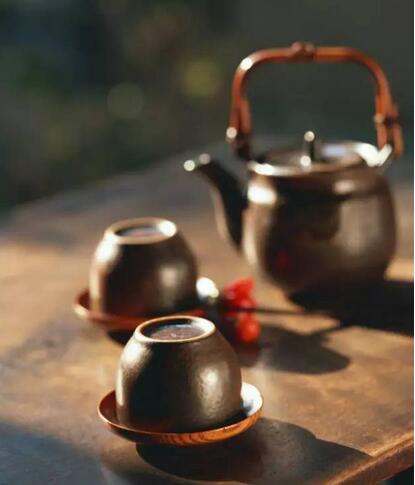From the perspective of Traditional Chinese Medicine, Pu-erh tea is red in color, which belongs to the fire element. It is warm in nature and slightly bitter, also associated with fire. Its mild taste corresponds to the spleen, which belongs to the earth element. Overall, it has the effects of warming and nourishing the spleen and stomach, as well as promoting diuresis. It grows in Yunnan, where the mountains are high and numerous, and the earth's energy is abundant. Therefore, Pu-erh tea absorbs more earth energy compared to other teas, making its effects on warming the spleen and stomach and aiding digestion stronger than other teas.
Newly produced raw Pu-erh tea has a strong bitter and astringent taste, with a potent purgative effect, making its digestive aid more intense. Drinking it on an empty stomach is generally hard for most people to tolerate. High-quality ripe Pu-erh tea, on the other hand, has a mellow and mild flavor, with gentle and long-lasting effects, making it easier to tolerate. After several infusions, its mild and bland taste becomes more pronounced, which is particularly beneficial for people with a spleen deficiency and damp constitution.

Regarding Pu-erh tea, the renowned Qing Dynasty TCM scholar Zhao Xuemin wrote in his Supplement to the Compendium of Materia Medica: "Pu-erh tea is warm in nature and fragrant in taste, produced in Youle, Gedeng... and the six tea mountains, with Yibang and Manzhuan teas being the most flavorful. Its bitter taste and potent nature can neutralize greasy and meaty toxins, but it is contraindicated for those with weak constitutions. Its astringency helps expel phlegm and promote bowel movements. Pu-erh tea paste, black as lacquer, is the best for sobering up, while the green variety is even more effective. It aids digestion, resolves phlegm, clears the stomach, and promotes fluid production, with particularly strong effects."
A Tibetan proverb praises Pu-erh tea: "Tea is blood! Tea is meat! Tea is life!" This highlights its vital role in Tibetan life, particularly for aiding digestion. Tibetans primarily consume beef, mutton, and butter, so Pu-erh tea's strong digestive and greasy-neutralizing effects are highly valued, aligning with Zhao Xuemin's descriptions.
Although Pu-erh tea aids digestion and neutralizes greasiness, it is important to note that TCM emphasizes balancing yin and yang, avoiding excess or deficiency, and not further weakening those already deficient. This principle applies not only to medicine but also to tea consumption. Therefore, drinking Pu-erh tea in moderation according to one's constitution and specific conditions is a rational and health-preserving choice aligned with TCM theory.